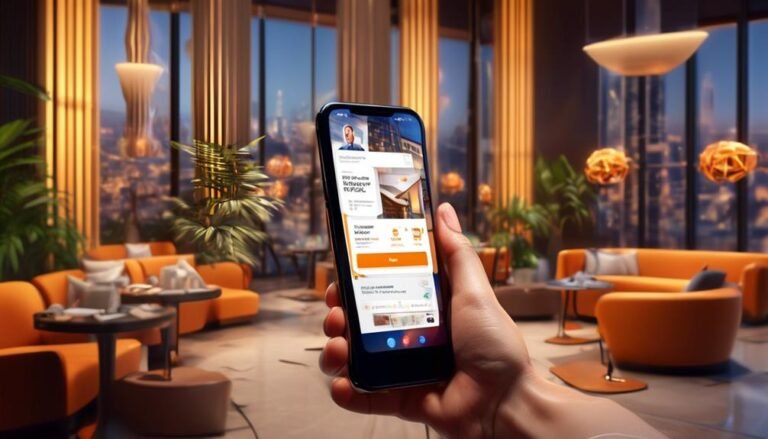Customer Retention Strategies for the Hospitality Industry
In the hospitality industry, customer retention is like tending a garden – it requires careful nurturing, regular maintenance, and a keen understanding of what each unique plant needs to thrive. As a hotel or restaurant owner, you know that the competition for guest loyalty is fierce, and the key to success lies in cultivating lasting relationships with your customers.
But how can you ensure that your guests keep coming back for more? The answer lies in implementing effective customer retention strategies that not only attract new guests but also keep them coming back time and time again.
Key Takeaways
- Prioritize creating personalized guest experiences
- Implement a well-designed loyalty program
- Provide a cohesive and effortless experience for guests
- Leverage customer data to tailor marketing strategies
Personalized Guest Experiences
To enhance customer retention, the hospitality industry should prioritize creating personalized guest experiences that cater to individual preferences and needs. Tailored recommendations and customized amenities play a crucial role in achieving this goal.
By leveraging guest data and preferences, hotels and resorts can offer tailored recommendations for dining, activities, and local attractions. For example, if a guest has previously shown interest in spa services, the hotel can proactively offer personalized spa packages upon their return.
Additionally, providing customized amenities such as pillow menus, preferred room temperature settings, or personalized welcome gifts can greatly enhance the guest experience. These personalized touches show guests that their individual preferences are valued and can lead to increased satisfaction and loyalty.
Effective Loyalty Programs
Consider implementing a well-designed loyalty program to incentivize repeat visits and build strong relationships with your guests. A good loyalty program can offer a range of benefits to your customers, such as exclusive discounts, free upgrades, or special access to events.
By providing tangible rewards, you encourage guests to choose your establishment over competitors, increasing their loyalty and lifetime value to your business.
When designing your loyalty program, consider creating different membership tiers to cater to varying levels of engagement. By offering escalating benefits based on the frequency or amount of customer spending, you can motivate guests to move up the tiers, leading to increased patronage and higher overall satisfaction.
It's crucial to regularly assess the effectiveness of your loyalty program by tracking key metrics like customer retention, average spend per visit, and overall program engagement. Use this data to make informed adjustments, ensuring your loyalty program remains relevant and compelling to your guests.
Seamless Customer Service

When aiming to provide seamless customer service in the hospitality industry, prioritize creating a cohesive and effortless experience for your guests, building on the foundation of effective loyalty programs to ensure a positive and memorable interaction at every touchpoint.
Consistent communication is key to achieving seamless customer service. Ensure that your staff is well-informed and equipped to provide accurate and timely information to guests at all times. Utilize technology such as messaging platforms or mobile apps to maintain open lines of communication throughout the guest's stay.
In addition to communication, streamlined processes play a crucial role in delivering seamless customer service. Evaluate every aspect of the guest experience, from check-in and room service to check-out procedures, and streamline these processes to minimize wait times and eliminate unnecessary steps. Embrace technology to automate routine tasks, reducing the potential for errors and enhancing efficiency.
Data-Driven Marketing Strategies
Leverage customer data to tailor your marketing strategies and enhance the personalization of your offerings in the hospitality industry. By utilizing customer segmentation, you can categorize your guests based on demographics, behavior, and preferences. This allows you to create targeted marketing campaigns that resonate with specific customer groups, leading to higher engagement and conversion rates.
Incorporate predictive analytics to anticipate customer needs and behavior. By analyzing past data, you can predict future trends and understand what your customers are likely to want. This enables you to proactively offer personalized recommendations, promotions, and experiences, ultimately increasing customer satisfaction and loyalty.
Implement dynamic pricing strategies based on data insights. Utilize customer data and market trends to adjust your pricing in real-time, maximizing revenue and occupancy. By understanding demand patterns and willingness to pay, you can optimize your pricing strategy to attract customers while ensuring profitability.
Innovative Engagement Tactics

Engage your customers through interactive experiences that foster meaningful connections with your hospitality brand. By incorporating interactive entertainment and experiential marketing into your customer engagement tactics, you can create memorable experiences that set your brand apart. Interactive entertainment, such as live music performances, interactive culinary experiences, or themed events, allows guests to actively participate and engage with your brand, leaving a lasting impression. Experiential marketing, on the other hand, focuses on creating immersive experiences that resonate with your customers on a personal level, fostering a stronger emotional connection to your brand.
To illustrate the impact of these innovative engagement tactics, consider the following comparison:
| Traditional Marketing | Experiential Marketing |
|---|---|
| Passive consumer participation | Active consumer engagement |
| One-way communication | Two-way communication |
| Limited emotional connection | Strong emotional resonance |
| Less memorable brand experiences | Memorable and impactful experiences |
Incorporating interactive entertainment and experiential marketing into your customer engagement strategies can lead to increased customer loyalty, positive word-of-mouth, and a competitive edge in the hospitality industry.
Conclusion
In conclusion, when it comes to customer retention in the hospitality industry, it's not just about keeping guests happy – it's about creating an unforgettable experience that they can't resist coming back to.
By personalizing their stay, offering irresistible loyalty programs, providing seamless service, utilizing data-driven marketing, and engaging them in innovative ways, you can turn casual guests into loyal advocates who wouldn't dream of staying anywhere else.
It's not just about customer retention – it's about customer obsession.




